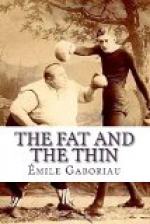It should be observed that the work does not merely treat of the provisioning of a great city. That provisioning is its scenario; but it also embraces a powerful allegory, the prose song of “the eternal battle between the lean of this world and the fat—a battle in which, as the author shows, the latter always come off successful. It is, too, in its way an allegory of the triumph of the fat bourgeois, who lives well and beds softly, over the gaunt and Ishmael artist—an allegory which M. Zola has more than once introduced into his pages, another notable instance thereof being found in ‘Germinal,’ with the fat, well-fed Gregoires on the one hand, and the starving Maheus on the other.”
From this quotation from Mr. Sherard’s pages it will be gathered that M. Zola had a distinct social aim in writing this book. Wellnigh the whole social question may, indeed, be summed up in the words “food and comfort”; and in a series of novels like “Les Rougon-Macquart,” dealing firstly with different conditions and grades of society, and, secondly, with the influence which the Second Empire exercised on France, the present volume necessarily had its place marked out from the very first.
Mr. Sherard has told us of all the labour which M. Zola expended on the preparation of the work, of his multitudinous visits to the Paris markets, his patient investigation of their organism, and his keen artistic interest in their manifold phases of life. And bred as I was in Paris, a partaker as I have been of her exultations and her woes they have always had for me a strong attraction. My memory goes back to the earlier years of their existence, and I can well remember many of the old surroundings which have now disappeared. I can recollect the last vestiges of the antique piliers, built by Francis I, facing the Rue de la Tonnellerie. Paul Niquet’s, with its “bowel-twisting brandy” and its crew of drunken ragpickers, was certainly before my time; but I can readily recall Baratte’s and Bordier’s and all the folly and prodigality which raged there; I knew, too, several of the noted thieves’ haunts which took the place of Niquet’s, and which one was careful never to enter without due precaution. And then, when the German armies were




